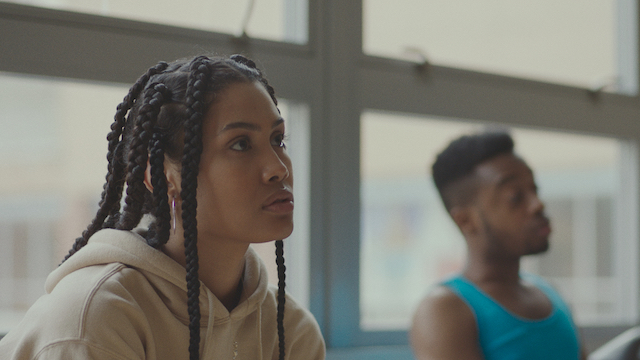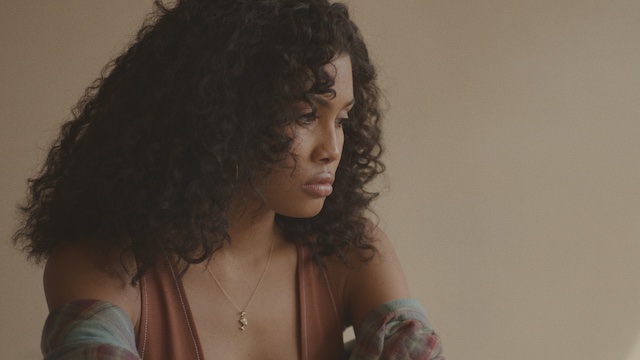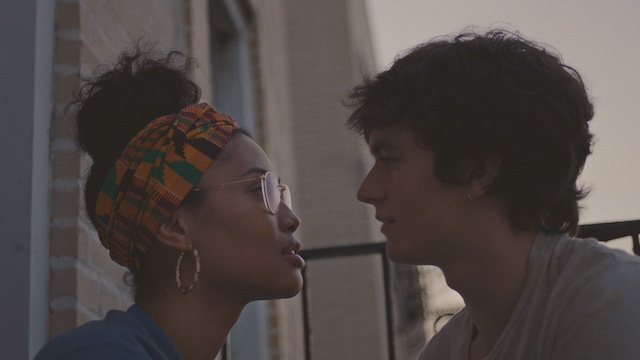Port Authority starring Fionn Whitehead and Leyna Bloom, is out today in select theaters and will be available on demand and digitally on June 1. Executive produced by Martin Scorsese, the romantic drama focuses on the budding relationship between Paul (Whitehead) and Wye (Bloom). It also explores the experience of being a trans woman in a major city and the difficulty and stigma attached to dating.
RELATED: Port Authority Trailer: Trans Romance Drama Stars Model Leyna Bloom
ComingSoon Editor-in-Chief Tyler Treese spoke with Bloom about the role, which is her first time starring in a film. The popular transgender model has made history by appearing on the cover of Vogue India and has worked with H&M, Moschino, Tommy Hilfiger, and more. She’s set to appear in the 2021 Sports Illustrated swimsuit issue as the first openly transgender Black and Asian-American model in the magazine.
Check out Bloom’s thoughts on trans relationships, making history, and much more.
Tyler Treese: In Port Authority, your performance alongside Fionn Whitehead really makes the film. Can you discuss your on-set chemistry and what it was like working together?
Leyna Bloom: I actually was a huge fan of Fionn’s work from Dunkirk. I saw that film when it came out literally a year before we shot it. So, when I found out that he was going to be the male lead playing my love interest in the film, I was super excited because I’m just a huge fan of his work. When we were on set, honestly, we just had this beautiful exchange of just what we’re about to do. I asked him a few different questions about why he wanted to do this project, and the answers that he gave me was so amazing. It just made me feel very comfortable with him right away. Since I am a new actress and sometimes when I needed some advice, he gave it to me, and he was just extremely professional. We hung out a few times outside of the set, and we just had this amazing, super down-to-earth connection. It was really sad when we wrapped because I felt like I’ve met one of my brothers. I’m so proud to see everything that he’s done, but yeah, we were just like brother and sister … we just did it for the culture.
I would have never guessed that it was one of your first major acting roles watching the film you put on such a natural performance. Can you talk me through kind of your mindset about the film and what advice you did receive? Because it certainly worked.
This is officially the first major film I’ve ever been in. Obviously, I’ve dabbled with video and videography because I come from fashion spaces. For me, just finding the emotion and the depth to go along with the story and understanding that the story is a very real story. That many trans bodies all around the world and especially in New York City, have experienced. So I wanted to stay authentic to that. For me, when I was, there was something that was really, really hard for me to remember and find out the technique how to memorize it. Fionn just gave me some advice, and it worked in the moment. I still apply that advice to my everyday life now because I’m doing other projects. Honestly, I’m still learning as an artist. You’re always learning about your craft, and that was a huge learning experience for me. It turned into a historical moment. So, I’m learning and making history at the same time, which is a powerful combination.
I wanted to ask you about that because you already have made so much history as both a model and now as an actress. As a trailblazer, that’s obviously such an honor, but it’s also a lot of pressure on yourself to really represent yourself well. How do you deal with that and balance that?
I think for me, how I’ve learned to balance it is because knowing that 10 years, 20 years ago, trans women and these spaces were not even thought of as a process of artistic expression. So the idea that I was born in a very sensitive time when we’re transitioning from that type of ignorance to this type of possibilities, I have to be very conscious of everything around me when it has to do with the elements of creativity. I have to make sure that when I do step out and go into auditions, or I do projects that I’m representing my community with the most respect and dignity.
It’s about living for today but also living forever. So 50 years from now, or when I passed on to a different life form, I want to be able to look back or have other people look back and say that when the time was for us to transition into this next possibility of human evolution. It was done with the most duty and the most respect for as the craft of the entertainment business. So I want to always show up and know my stuff. If I don’t know it, hire the people and just kind of also live in the moment and be authentic to what’s happening in the world and what’s happening in my life and what I can bring that into the projects that I’m on.

You speak about authenticity, and the film takes place in New York City. New York is a really great city, but it’s a complicated one. It’s a place that a lot of people go for a fresh start and dreams of opportunity. But as the film shows, it’s not always an easy life in New York City. Can you speak to your relationship yourself with the city and getting to portray that in the film?
Absolutely. I moved to New York City when I was 17. I dropped out of high school because the resources that were available to me in Chicago were kind of detrimental to my lifestyle. So I had to escape from that jungle to go to this jungle. I live in New York City right now, and I’ve been living here ever since. When I first arrived, I was dealing with the things that Paul was actually feeling arriving at Port Authority. The thing about him is he had someone that lived in the city that he could just ring a bell to. I didn’t have that. So I had to rely on just my human instincts, the know-how to survive in this environment. Obviously, coming from Chicago, you’re in a murder capital, so you have some street smarts.
So when I came here, I was 17 years old, and I had a dream, and I had a wish. I just put all my wishes and my dreams into everything I had. This is the fruit of the labor of the seeds being planted because of that. So it was hard. A lot of it was my story. I dealt with a lot of homelessness, and a lot of trans bodies that live in New York City deal with homelessness. It was just really, really sad. I could actually sit down and talk to Paul about that, about you’re playing a character that’s homeless, here’s a person that has actually been homeless that has made it. It was a powerful exchange with him in that moment.
The New York City ballroom scene is a large part of the film. And I’ve read that you’re actually a mother of a house. So, uh, how cool was it getting to represent that the culture on screen?
It was amazing. I have been involved with it since I was 15 years old, and ballroom has always been a refuge for me to just find myself and to find other people like me who are creative. Who also have been neglected in society that we find each other and we choose each other. So that’s why there’s this big language about chosen family in the film and in our culture that we pull from. So I think it’s a powerful tool, and now it’s mainstream, and everyone that is feeling like they don’t have a place too [can] find it in ballroom. This is what that film is about. Paul’s character finding family in the arms and in the homes of black and brown bodies that come from broken homes or homes that don’t appreciate them. It’s very dynamic how that is presented in the film and how that is lived in society today.
I think there’s a real message there. The ballroom scene is so diverse, so even if people come from different backgrounds, there’s still a mutual understanding. Do you feel by showing this on the screen, since there’s still so much misunderstanding around trans women in relationships, that we can kind of educate and better people’s understanding by showing it so authentically here?
Absolutely. Love has to be humanized because everyone needs to love because everyone comes from love. So, I think being a trans woman in a relationship is very new for the world to see because their world often doesn’t see trans women as bodies to be loved. So I’m doing this with the team and joined us with the crew in doing this with this amazing script and amazing cast that really showcases this newfound idea based around what is love to everyone and how can we change the narratives based around love. Because love is no longer a traditional aspect. Love is explored in infinity and beyond, and it can give new meaning to that. So I think this movie sets the tone for the next films that are going to be embarking on this journey of trying to change this narrative around the spectrums around love.

One thing I really liked about the film was that the romance in Port Authority, it’s not picture perfect. I don’t even know if you’d call it ideal, but it feels very real. Can you just discuss to the relationship Wye and Paul has, and talk about how you felt about that? Because it comes across on screen is very authentic and real true to life rather than romanticized.
A big part of my career is talking about love and self-love and the embodiment of the music. That’s the base around love. This story is about two professional actors trying to really capture the essence of love. We come from different walks of life as we should, and we’re trying to just come together to just see where the puzzle piece fits. Obviously, we’re stopping, and we’re questioning ourselves because there’s obviously guidelines of what you can and cannot do, but we dispense of those. I feel like this film allows people to love differently and to see love differently. That’s why it’s so powerful that we’re in this time right now where we are redefining all the ideas around us, and we’re leading with our own, instead of leading with this conscious of like, “Oh, the Bible says this. And my mother said that. And like, my grandmother said that,” or like, “the government says this.” So I think it’s just we’re listening to ourselves, and we’re just going with what the energy throws us. A lot of the things that we did in the film, that was really the next level of romance. It was really just raw of just me and Fionn just understanding what is happening in this moment and how important it is and how we can bring it to life. I think that’s kind of like we did that, and people will definitely see that and feel that when they see it just like you have.
One of the most emotional scenes in the film happens after Paul finds out that Wye is trans. There’s a moment in the film where Wye is really putting herself out there, and they share a very vulnerable moment. Can you just talk about that depiction? There’s a lot of risk with trans women being on the dating scene, and it’s put very honestly in the film. Can you just speak to that?
We live in a time right now where humanity cannot be put into two genders and one sexuality, especially in a city like New York City. New York City is a mecca of many different colorful ideas and bodies and ways to explore ourselves. … There’s something truly raw and real about just an organic connection that it’s not based around labels or layers. It’s a magic with eye contact. It’s a magic with silence. It’s a magic with just eating a slice of pizza and those things we take for granted so much. This movie depicts just the essence of a raw connection that someone has and how we’re not being subdued to what the world says.
We’re breaking that down. We’re just living for ourselves and living for this energy that we’re sharing together. That’s something that if we really pay attention to, the world would be a much better place if we understood that. Also, that scene that we shot was a lot of ad-libbing. I studied a line for weeks, and it was now time to do the scene. I went to the director, and I went to Fionn, and I was like, “This doesn’t seem authentic in this moment. Like yesterday, I felt good, but today it doesn’t feel authentic. We need to make this feel more authentic.” We were doing it raw. We were on location, and there’s trains going left and right, left from right.
Like we can’t stop that MTA train system, it has to keep going. So a lot of times, we had to stop. We have to cut and that particular scene. We just went with it and whatever happened happened. I don’t remember being stuck to something. I just wanted to be free, and in that moment, I wanted to say, “Tell me you didn’t feel something.” You know what I mean? You know, it was just powerful. That was a really important scene in that film, and it was about just saying my truth and making sure that me and Paul’s character, understand this is just between me and you. This is not between anyone else.










